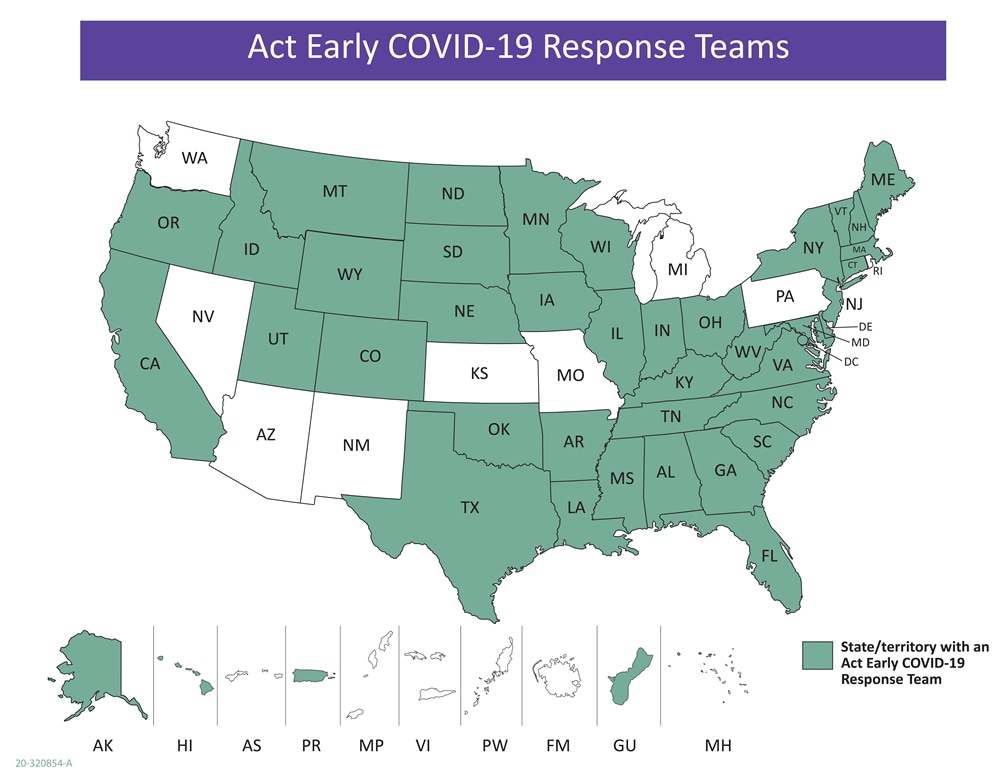CDC’s Act Early Initiative
The Act Early Initiative promotes collaboration among early childhood programs in states and territories so children with autism or other developmental disabilities can be identified early and get the services and support they and their families need.
Working with state, U.S. territory, and national partners, CDC aims to help improve early childhood systems by:
- Supporting Act Early Ambassadors to expand the program’s reach.
- Facilitating the sharing and promotion of best practices, resources, information, and announcements related to improving early identification of developmental delays and disabilities among state, territorial, and local health officials and others involved in early childhood programs.
- Promoting the adoption and integration of LTSAE resources and materials to support developmental monitoring in systems that serve young children and their families.
CDC works with the American Academy of Pediatrics (AAP) to administer the Act Early Initiative.
Act Early Ambassadors
Act Early Ambassadors expand the reach of the “Learn the Signs. Act Early.” program and support their respective state’s work toward improving early identification of developmental delays and disabilities, including autism.
Since 2011, professionals with medical, child development, developmental disability, special education, and early intervention expertise have been selected to
- Serve as a state or territorial point-of-contact for the national “Learn the Signs. Act Early.” program;
- Support the work of Act Early Teams and other state/territorial or national initiatives to improve early identification of developmental delay and disability; and
- Promote the adoption and integration of “Learn the Signs. Act Early.” resources into systems that serve young children and their families.
See how Ambassadors and others across the nation are promoting early identification of delays and disabilities using LTSAE.
The Act Early Ambassador program is a collaborative effort of CDC’s National Center on Birth Defects and Developmental Disabilities and the American Academy of Pediatrics.
Act Early Network
The Act Early Network listserv provides resources, information, webinars, and announcements related to improving early identification. Act Early network members include past Act Early Regional Summit participants, State Team members, current and former Act Early Ambassadors, and anyone interested in improving early identification. Email ActEarly@cdc.gov to join the listserv.
Act Early COVID-19 Response Teams (2020 – 2022)
The COVID-19 pandemic and associated stressors can affect children’s development and well-being. CDC funded 43* State and Territorial Act Early COVID-19 Response Teamsexternal icon with a two-year grant opportunity to support families and systems affected by COVID-19. This nationwide initiative is focused on support for early childhood state systems through the Act Early Networkexternal icon to support recovery and strengthen resilience skills, behaviors, and resources of children, families, and communities.
Click here to learn more about this initiative.
*41 teams were funded during Year Two
Act Early State Systems Grants: 2011-2019
In 2010, with support from CDC, AMCHP began funding grants to states as part of the larger Act Early Initiative. These grants were designed to strengthen state and community systems for early identification and coordination of services for children with developmental disabilities. To learn more about the specific strategies and implementation activities, click to view the interactive resource, “Learn the Signs. Act Early. AMCHP’s State Systems Grant: Eight Years in Review.”

